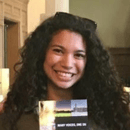This is a sponsored feature. All opinions are 100% from Her Campus.
Disclaimer: The author is speaking from her experiences as a cisgender woman, but recognizes that it is one faced across genders and sexualities.
Being a woman comes with a handbook of rules to follow. It’s a long list that will spill out of you if you let it.
For me, it goes: don’t go out alone at night, even though some of the worst crimes get committed in broad daylight; always check behind you because saving your skin is worth getting whiplash; don’t trust your shadow and its footsteps because another one may be hiding behind it; hold your keys between your fingers to make a speared metal fist; cross the sidewalk, then the street, then the highway because good god, girl, just lose him; use fear to make you walk like you mean it; smile or don’t smile, they will ask you to anyway; make yourself small so they can’t touch you, except they will touch you, in places you don’t want them to, so you’re going to exorcise yourself from your own body; when catcalled, do not speak to them or make eye contact because you have to do your best to erase yourself away until all that’s left is smudges; and lastly, but not lastly, because the list never ends, remember that timing is everything because people tell you that you can say no, but they don’t tell you that you have to be careful of when and how you say it.
You have a list, too. Chances are that it doesn’t look exactly like mine. It’s similar, though.
We aren’t born with the rules; we pick them up along the way. We take them from our family and friends and the people we meet when we listen to what their lists look like and what they think our lists should be. The news, TV shows, movies, magazines and books—these are the kinder teachers, we’ll internalize rules from without knowing we’ve done so. Because personal experience will force it on you, brutish and violent, whether or not you want to learn. You’ll remember best what happens to your body, how it’s looked at and treated, because of the unforgettable imprints left behind.
I started hating the handbook when I was fifteen. That summer, I couldn’t sleep. I’d go to bed, and the paranoia would set in. I’d look for things in the dark that weren’t there, and I’d listen for the aches and moans our house made. I constantly checked the other side of my bedroom, and I’d imagine who or what the sounds below could belong to. My anxiety would creep until finally, I succumbed to it and got up, turned on the lights, and went into the hallway. I’d gaze into the darkness for minutes on end, my breathing jagged and my heart racing as I waited for something without a name or a face to catch me standing there.
It had never happened when my family lived in the city. I could sleep at friend’s houses and in hotel rooms perfectly fine. It was only there, in that big quiet suburban house, that I felt afraid, and my mind would hold me hostage for hours before I could sleep. When that anxiety kept coming back for me, my fear started to envelop the night as well. I’d dread when the sun would set, because I knew it meant I was that much closer to the sequence of restless tossing and turning, sweating until my clothes were soaked, and making desperate pleas to a God I didn’t believe in to let me sleep.
Once school started up again, I got busy and had less energy to spend anxiously wasting the night away. It never fully left me, though—that paralyzing fear of what lives in the shadows. I just learned to subdue it. I had never thought of the rules, never given them a shape or form in my mind, but they lingered.
At seventeen, my guidebook to being a woman took me in its thralls again. The #MeToo movement was gaining traction. Every time I turned on the news, there was another story about a public figure that had been accused of sexual assault or rape. At school, girls I knew started talking about their experiences. They were open, and they were brave. I had immeasurable respect and admiration for those who spoke out and had the courage to tell their stories in a world wired not to believe them and exact justice. I was grateful when people trusted me enough to share what they had been through. But that shift in culture made it so that everywhere I turned, I was reminded of my own vulnerability.
I hadn’t been blind before the movement started. I knew that as an Asian woman, I was at a higher risk of being harmed, stalked, kidnapped, violated, or killed. But I had never been afraid of it before. I had never thought of it as something that could happen to me. I didn’t realize exactly how relevant these experiences were to me until, during class, a girl did a presentation on sexual violence. In it, she gave us this statistic: one in three women experience some sort of sexual violence in their lifetime. I looked around at my class with a female-majority and started to count the heads, wondering—here, which of us will be the unlucky ones?
I grew an anxiety around it. I couldn’t take books, TV shows, or movies that dealt with the topic. When people spoke about it, I appreciated the conversation, but found it difficult to stomach and often had to leave rooms to find the space to breathe.
Still, I have a hard time confronting this reality. I resent how I have to adjust my day-to-day around what is safe for me and what is not. I hate that handbook and how it is ingrained in my thoughts and actions. I used to think that these two experiences were entirely separate; they were two different paranoias. My fifteen-year-old self was afraid of invasion of the home, while my seventeen-year-old self was afraid of invasion of the body. But I’ve come to realize that they are one and the same.
The thing without a name or a face that I’m always looking for in the dark is a man that sees my body as a thing to be conquered. With both of these fears, it is the thought of being physically powerless that renders me mentally powerless as well. So, in small ways, I’ve started to try and take some of that power back. I say no, and it’s respected. In classes, I reflect on how my experiences have been influenced by gender, and I realize that it isn’t my fault I feel weak—it is society’s for teaching me that I am so. I talk through it in therapy, and I start to write a different handbook.
For me, it goes: be brave, be bossy, be bitchy, be unapologetic, be kind, be proud, be everything you want to be and everything they don’t expect you to be. Know the other rules society makes, because you can’t fight to change the system if you aren’t staying alive in it, but give them a big ‘fuck you’ every chance you get.



